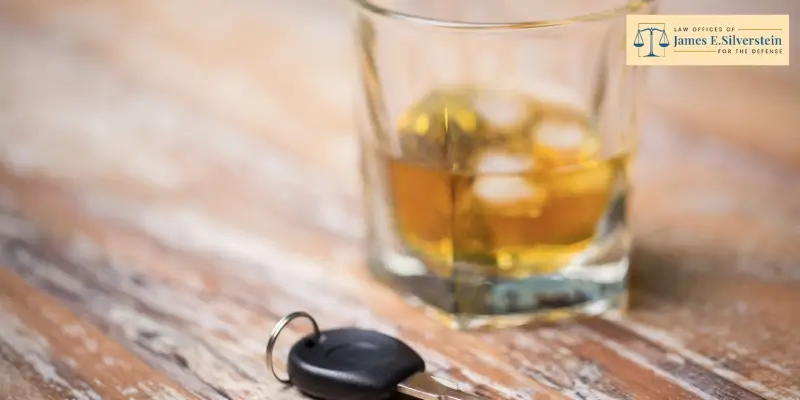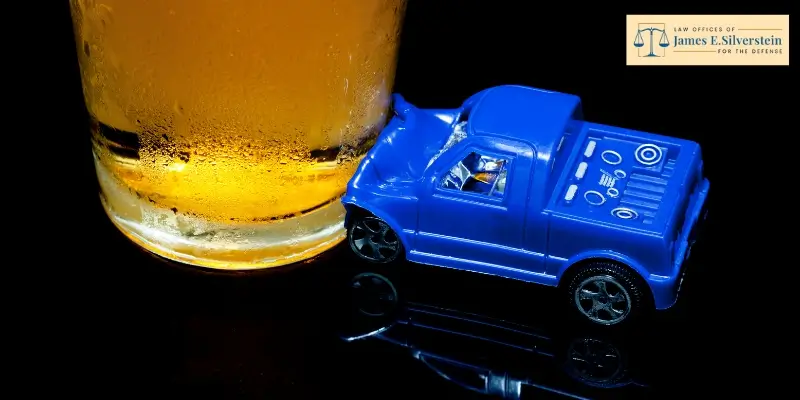Over 20 years of legal experience
Westlake Village DWI Lawyer
Westlake Village DWI Attorney
It’s vital to acquire the help of a qualified DUI attorney to avoid criminal penalties and various negative impacts a criminal conviction can have on your future. Driving under the influence (DUI) of alcohol or drugs is among the most commonly charged crimes in the country. However, it should be emphasized that this is a serious offense. Take early action by contacting a Westlake Village criminal defense lawyer to improve your chances of a favorable outcome.

The team of criminal defense professionals at the Law Offices of James E. Silverstein can provide you with knowledgeable legal counsel and dedicated representation. We represent clients for first-time DUIs as well as repeat offenses, including driving while intoxicated (DWI) charges with aggravating circumstances or concurrent offenses such as drug possession, vehicular manslaughter, or violating parole/probation.
Drunk or Intoxicated Driving Laws in California
It’s prohibited by California and federal laws for any motorist to drive while under the influence or intoxicated. DUI and DWI are interchangeable terms for the same crime. Impairment may be from alcohol, illicit drugs, and prescription or over-the-counter medications.
If a driver is found to have a blood alcohol content (BAC) of 0.08 or higher, it is presumed that their faculties are affected to the point where they cannot reasonably drive in a safe manner, and they will be charged with a DUI. For drivers whose job is to operate commercial vehicles, the legal drinking limit is 0.04 percent or above. California has a zero-tolerance policy for underage alcohol consumption, so any detectable BAC above 0 percent warrants a DUI charge.
Testing the levels of alcohol in a person’s system, their blood alcohol content, or concentration can be performed on-site during the traffic stop using a breathalyzer, a small machine. This entails blowing into the breathalyzer, after which a percentage of the alcohol levels detectable in one’s breath will come up. BAC can also undergo additional chemical testing off-site, during which the driver’s blood, saliva, or urine may be analyzed.
An officer may also ask the suspected driver to participate in field sobriety tests, especially if they believe you may be under the influence of narcotics or other drugs. Field sobriety tests are designed to evaluate your faculties—like your reaction time, coordination, and sense of orientation (balance)—and may include tasks such as finger-to-nose, walking heel-to-toe in a straight line, reciting the alphabet backward, standing on one foot, and other various activities.
While these tests aren’t precise, and one failed test alone isn’t likely to result in an arrest or secure a conviction, they can give the officer a better sense of whether to bring you in for additional chemical tests.
Implied Consent and Probable Cause Laws in DUI Stops
All drivers who have a license to operate a vehicle also have the privilege of using public roadways and highways. What every motorist may not know, however, is that this driving privilege inherently includes your “implied consent.” This means that a licensed driver is presumed to agree to comply with any request for preliminary alcohol screening tests that law enforcement may request with reasonable cause.
Implied consent laws exist since driving is a privilege, not a right, which can be revoked if the motorist does not adhere to traffic laws and disregards the safety of other people while on public roads. For a law enforcement officer to test a driver’s BAC, there first must be reasonable suspicion that the motorist is driving while impaired. This is also known as probable cause, which must be lawful. An officer can’t stop or pull over someone with no valid reason.
Typically, the officer will request a preliminary alcohol screening during a traffic stop, the reason for the stop stemming from an unrelated concern. Valid and lawful reasons an officer may stop a driver in the first place before testing for sobriety include:
- Traffic offenses such as an equipment violation, ignoring road signs or other traffic indicators, etc.
- Reckless or negligent driving behaviors such as speeding, weaving in and out of lanes, drifting over a line, wide turns, nodding off at the wheel, or appearing asleep while at a traffic light or along the shoulder of the highway.
- The driver admits to drinking before driving.
- Another party notifies law enforcement that they knew or saw the motorist drinking or consuming drugs prior to driving, or the officer witnessed such behavior themselves.
- Officer observation of warning signs the motorist is under the influence of alcohol or otherwise impaired, such as slurred speech, general confusion, bloodshot eyes, or smell of alcohol.
- An open alcoholic container is within reach of the driver in the passenger area of the car.
It should be noted that probable cause or reasonable suspicion is necessary to obtain a preliminary alcohol screen, with the exception of drivers under the legal drinking age and any motorists currently on probation for a previous DUI conviction. In these instances, the law enforcement officer does not require probable cause since there’s reason to believe another inherent violation is taking place.
Criminal Penalties and Administrative Consequences for a DUI
In California, a person’s first three DUI charges will usually be treated as a misdemeanor offense unless aggravating factors are present. Misdemeanors can result in serious penalties and significant consequences if the defendant is convicted, even for a first-time DUI violation. Conviction may be punishable by time in jail, penalty fines, and a loss of driving privileges upon the suspension of your license.
Depending on your circumstances, your DUI attorney in Westlake Village may be able to secure a lesser sentence for you. For example, sometimes, the judge will allow the offender to sustain a shorter suspension period on their driver’s license if they agree to the installation of an ignition interlock device (IID) in their vehicle. An IID enables it so a driver cannot start their car until blowing into the device, confirming they do not have alcohol in their system; otherwise, they cannot drive.
Criminal penalties are likely to be more extensive for repeat offenders. California has a 10-year lookback period for DUI convictions. This means if you’re charged with a DUI eight years after a previous DUI conviction, the crime can be treated as a second DUI and may result in harsher punishment. A DUI may be elevated from a misdemeanor to a felony if there are aggravating factors or if it is the driver’s fourth or subsequent DUI charge.
Conviction for a felony DUI is punishable by incarceration within a state prison—which can be stricter as opposed to a county jail—extensive fines, extended period of license suspension, or IID installation. Penalties for a felony DUI can vary depending on your criminal history and the details of the crime itself. Aggravated DUIs tend to face punishment on the harsher end of the scale. Aggravating factors within a DUI include:
- Causing an accident resulting in the physical harm or death (vehicular manslaughter) of one or more individuals, including bystanders.
- Excessive BAC of 0.15 percent or above.
- Refusing to submit to any chemical testing for alcohol or other substances in your system after arrest.
- Minors under the age of 14 are present in the vehicle during arrest for driving under the influence.
- Speeding 20 mph or more above the speed limit within a residential area or 30 mph above the limit on the highway.
Additional Repercussions of a DUI Conviction on Your Life
The criminal and administrative penalties of a DUI conviction are reason enough to fight the charges against you. However, it should be emphasized that there are additional negative effects a criminal conviction can have on your life and future in the long term. Regardless of sentencing, the stigma of being a convicted felon may very well put strains on your personal relationships, which may, in turn, negatively impact your mental health and ability to move forward.
Furthermore, a conviction on your criminal record can make it difficult or nearly impossible to find stable housing, or you may even be forced to settle for an unfavorable lease. You may also struggle with finding new employment and face frequent rejection from various job opportunities and promotions. Felons may also be restricted in pursuing a career of their choosing or even have their professional work licenses revoked upon a DUI conviction.
For these reasons, it’s incredibly important to fight against a DUI charge in Westlake Village —whether it’s a first-time offense or your fourth offense. Your criminal record will follow you for the foreseeable future, showing up any time a landlord or potential employer runs a background check on you. A dedicated DUI defense lawyer can work diligently to prevent your conviction or lessen the repercussions that may follow a guilty verdict.
Potential Defense Strategies for a DUI Case in California
There are numerous defensive arguments your legal team may opt to use when building a strong case on your behalf. An experienced lawyer knows which strategies are likely to be most advantageous for the unique circumstances. These are just some defense strategies your attorney may utilize:
- There was a lack of due process within your arrest, or probable cause was not properly established prior to the arrest.
- There was a violation of your civil or constitutional rights.
- Challenging the validity of results from a chemical test, e.g., incorrectly administered testing procedure, faulty equipment, and other errors.
- Rising BAC during the stop. This defense argument asserts that the defendant’s BAC would have remained under the legal limit upon arriving at their nearby destination if they had not stopped. Instead, their BAC had time to rise as their body continued to process the alcohol while the driver was being arrested and brought in for further chemical testing.
- The defendant was coerced into drinking and driving by a police officer.
- Immediate threat. The motorist only drove under the influence in order to evade what they reasonably deemed to be an immediate threat to their physical safety (this strategy only works if you did not hurt anyone else and the physical threat is provable).
FAQs About Westlake Village DWI Law
How Much Does a DUI Lawyer Cost?
In California, most DUI defense lawyers charge clients on an hourly basis for their legal services, and the total costs of their counsel and representation can depend on the complexity of your case. The longer your case takes, the more work your defense lawyer can expect to put toward providing the representation you deserve and the more it’s likely to cost overall.
Should I Hire a Lawyer for a DUI?
Yes, it is highly advised to seek the services of a qualified and professional defense lawyer when facing a DUI charge. Having strong legal counsel is preferable to representing yourself or accepting all charges and subsequent sentencing. Your defense attorney can explain all of your options, provide insightful advice, speak on your behalf, and protect your legal rights as they only act with your interests and well-being in mind.
What Makes a DUI an Aggravated Offense?
In California, a DUI may be viewed as aggravated and, therefore, a felony offense if there are certain factors involved. These factors include having a minor in the car, causing an accident resulting in the physical harm or death of another person, having an excessively high BAC (0.15 percent or above), speeding excessively over the local limit, the DUI is the fourth or subsequent charge against the driver, and refusing to chemical testing, among some others.
How Long Does a DUI Remain on Your Criminal Record?
In California, a DUI conviction will remain on your criminal record for a duration of 10 years. During this lookback period, the offense is viewable on your criminal record and will show up on any background checks someone conducts on you. Additionally, any additional DUI charges during this time will be treated as repeat offenses and are subject to more serious penalties upon conviction.
Experienced and Skilled DUI Defense Professionals
At the Law Offices of James E. Silverstein, we have successfully represented countless defendants facing DUI charges. Our defense lawyers also provide help with Department of Motor Vehicles’ hearings regarding a client’s license suspension. Contact our team today to schedule a consultation.




